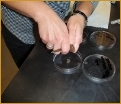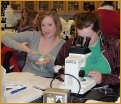Developmental Biology - BIOL 406
Catalog Description
Concentrates upon mechanisms and principles involved in cellular differentiation and integration that accompany development of organisms from single cells into complex, multicellular structures. Beginning with relatively simple organisms and progressing to more complex examples of higher plant and animal developmental processes, the student is exposed to both descriptive information and experimental investigative techniques. Prerequisites: BIOL 208, BIOL 209, BIOL 305, BIOL 344.
Current Syllabus
Developmental Biology – BIOL 406
Syllabus and Schedule
Lecture MWF 12:10-1:00PM – BY 108
Lab Section 01 Thursday 9:35AM-12:15 – BY 202
Lab Section 02 Thursday 1:50-4:30PM – BY 202
Instructor Dr. Carol Z. Plautz
Email cplautz@shepherd.edu
Office Byrd Science Center 112
Laboratory Byrd Science Center 200/202
Phone (304) 876-5773
Office Hours M, W, and F 10:00-12:00 and by appointment
Catalog Description:
[This 4-credit course] Concentrates upon mechanisms and principles involved in cellular differentiation and integration that accompany development of organisms from single cells into complex, multicellular structures. Beginning with relatively simple organisms and progressing to more complex examples of higher plant and animal developmental processes, the student is exposed to both descriptive information and experimental investigative techniques. Prerequisites: BIOL 208, BIOL 209, BIOL 305, BIOL 344.
Required books:
- Scott F. Gilbert, Developmental Biology, 9th edition. 2010, Sinauer. ISBN 978-0-87893-384-6
- Gary C. Schoenwolf, Laboratory Studies of Vertebrate and Invertebrate Embryos, 9th edition. 2009, Pearson. ISBN 978-0-321-55694-3
Other required material:
- Notebook of your choice, suitable for recording your observations and drawings
- Pencils and colored pencils
Additional resources:
- There is an online companion/supplement to your book at: http://9e.devbio.com/
- There is a companion/supplement website called vade mecum3 which may be accessed via http://labs.devbio.com/ and the Registration Code found on the inside cover of your textbook
Attendance: Regular, on-time attendance in lecture and lab is required for success in this course. Absences will result in missed information, missed activities, and missed (grade of “zero”) quizzes, none of which can be recouped. Timing is critical in development: arrive, and arrive on time.
Academic Integrity: Cheating of any sort (including plagiarism and unauthorized collaboration) will NOT be tolerated (refer to the section entitled “Academic Dishonesty” under “Academic Information” in the Shepherd University Catalog for a full description of Academic Dishonesty). All parties participating in such activity will receive a grade of “zero” for their “work”. For second offense, student will receive a final course grade of “F”.
The last day to withdraw from this course is April 8, 2011.
Grading:
- Exam #1 100
- Exam#2 100
- 5 lab quizzes 20 pts each (drop lowest 2 of 7) 100
- Final Exam – cumulative 200
- Lab notebook 100
- Final paper/presentation 100
- Total Points: 700
Final Grades:
- A 630-700 (90-100%)
- B 560-629 (80-89%)
- C 490-559 (70-79%)
- D 420-489 (60-69%)
- F 419 or lower (0-59%)
Make-Up Policy: Exams: Make-up exams will be given if: 1) the student has obtained permission from Dr. Plautz prior to the exam, or 2) there is a documented medical/family emergency, brought to the attention of Dr. Plautz (in person, by telephone, or email) prior to or within 2 business days after the exam. Otherwise, exams must be taken at the scheduled time or a “zero” will be given. Quizzes: There will be no make-ups for quizzes or laboratory activities. To allow for unexpected emergencies, students will drop two quizzes as noted in “Grading” above.
Other Policies:
* I expect you to read the assigned material prior to the corresponding lecture.
* Inclement weather: if the University is open, class will be held. Shepherd University communicates closures due to weather through several means including NBC-25 TV, several local radio stations, announcement on the website (www.shepherd.edu), and announcement on the main phone number (304) 876-5000. Commuters should observe common sense with regard to road safety. See “Snow Policy” in the Shepherd University Student Handbook.
* No food or drinks in the classroom/lab at any time. Leave them outside on the chair.
* Other laboratory safety & cleanliness rules will be discussed in lab – students must abide by these.
* Your phone is not to be seen, heard, or used during class or lab (exception: if you need it for emergency contact, put it in your pocket on “vibrate”).
* Failure to abide by these policies may result in a final course grade of “F”.
The Final Paper/Presentation:
Each student is to select a research article (not a news report, not a review article) from one of the following four peer-reviewed scientific journals: Development; Development, Growth & Differentiation; Genes and Development (these may be accessed by visiting the SU Scarborough Library website and clicking on “Full-text Journal listing”); or Developmental Biology (these articles may be obtained from Dr. Plautz; view Tables of Contents at: http://www.sciencedirect.com/science/journal/00121606). Other peer-reviewed journals are acceptable on a case-by-case basis. You may choose a written or oral presentation of that research article (complete guidelines will be handed out and reviewed in class), either of which will be due on April 28.
To account for unforeseen circumstances, this syllabus & schedule may be altered at the discretion of the instructor.
APPROXIMATE SCHEDULE – BIOL 406 – Spring 2011
|
Week of |
Lecture Topic |
Assigned Reading |
Laboratory Activity |
|
Jan 10 |
Introductory Material Intro to Developmental Biology |
Part I (“Questions”) and Chapter 1 |
Roundup of model systems; Movies; Toolmaking |
|
Jan 17 |
Mon., Jan 17: No Classes Developmental Anatomy |
Chapter 1-2 |
Microscopy and Gametogenesis |
|
Jan 24 |
Developmental Genetics
|
Chapter 2 |
Echinoderms I: fertilization |
|
Jan 31 |
Cell-Cell Communication |
Chapter 3 and Part II (“Specification”) |
Echinoderms II
|
|
Feb 7 |
M: Exam #1 W/F: Fertilization |
Chapter 4 |
Echinoderms III
|
|
Feb 14 |
Early invertebrate development |
Chapter 5 |
Snail development
|
|
Feb 21 |
Amphibian & Fish development
|
Chapter 7 |
Intro to Amphibian development |
|
Feb 28 |
Amphibian & Fish development
|
Chapter 7 |
Amphibians II |
|
Mar 7 |
M: Exam #2 Bird & Mammal development |
Chapter 8 |
Mammalian development |
|
Mar 14 |
No Classes – Spring Break |
-- |
-- |
|
Mar 21 |
Bird & Mammal development
|
Chapter 8 |
Chick development I |
|
Mar 28 |
Ectoderm |
Part III (“Stem Cells”) and Chapter 9 |
Chick development II
|
|
Apr 4 |
Heart & other mesoderm development |
Chapter 12 |
Hydra & Planaria regeneration
|
|
Apr 11 |
Limb development |
Chapter 13 |
Analyze regeneration; Movie
|
|
Apr 18 |
Regeneration Thur. and Fri., Apr 21-22: No Classes |
Regeneration handouts and Chapter 15 (Regeneration section) |
-- |
|
Apr 25 |
Additional topics (“Evo-Devo”) |
TBA (Chapter 19) |
Student presentations/papers Laboratory notebooks due |
|
May 2 |
Mon., May 2, 3:00-5:00PM: Final Exam |
-- |
-- |


